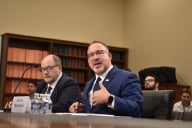You have /5 articles left.
Sign up for a free account or log in.

After the California Supreme Court denied to hear the case, the California Legislature could overturn a court-ordered enrollment cap at UC Berkeley.
S. Greg Panosian/iStock/Getty Images Plus
When California’s Supreme Court declined earlier this month to hear an appeal from the University of California, Berkeley, to overturn an enrollment cap ordered by a lower court, it disappointed the university and thousands of prospective students.
Now there’s new hope as state lawmakers attempt to fast-track a legislative solution that would allow Berkeley to maintain its head count.
Each house of the California State Legislature introduced a bill Friday that aims to spare Berkeley from shedding as many as 400 students—original estimates ran as high as 3,050—by changing how the California Environmental Quality Act applies to colleges. UC Berkeley was initially sued under CEQA by Save Berkeley’s Neighborhoods, a local community group that has protested its plans to grow enrollment. The bills are SB 118 and AB 168.
Understanding the Legislation
In short, the proposed legislation would provide colleges and universities with an 18-month window to certify court-ordered environmental reviews before an enrollment freeze can be ordered. Language in both bills indicates the legislation would also “delete the provision requiring the environmental effects relating to changes in enrollment levels be considered in the [environmental impact review] prepared for the long-range development plan.” Simplified, that means plans to increase enrollment will not be treated the same way as a building project in terms of evaluating environmental impact.
The legislation also changes wording so that colleges must consider the environmental impact of their “campus population” above and beyond student enrollment, meaning faculty and staff members are included in the overall head count. That change gives colleges flexibility to alter staffing levels, perhaps reducing the number of employees physically working on campus, to lower the overall population.
If passed, the bill would apply retroactively, thus solving UC Berkeley’s woes in figuring out how to accommodate as many students as possible under the mandated enrollment cap, a process that has meant deferring students or shifting them online or to satellite campuses.
If signed into law, the legislation will take effect immediately.
A Legislative Reprieve
In a joint statement, State Assembly Speaker Anthony Rendon and Budget Chair Phil Ting criticized the court-ordered enrollment cap and noted the reprieve the legislation would provide.
“It aims to make sure that environmental analysis of campus development plans continues to consider campus population impacts, while also giving higher education leaders a chance to remedy deficiencies before enrollment reduction mandates are issued,” part of the statement reads. “We believe this addresses concerns from both sides and allows us to continue educating deserving students. When our legislation passes and allows the law to be applied retroactively, UC Berkeley will be able to resume its enrollment plan, which was disrupted by a misguided court order.”
Despite his efforts to throw UC Berkeley a legislative lifeline, Ting has been critical of missteps by the university. He told the Los Angeles Times that UC Berkeley dramatically missed the mark on projected enrollment numbers in its long-term development plan, shorting the count by some 11,000 students and exposing itself to challenges from neighbors that prompted the enrollment freeze.
Ting also criticized UC Berkeley’s delay in asking for a stay of the court-ordered enrollment cap, which came in January rather than in October when the ruling was handed down.
“I don’t see this as a flaw within the process,” Ting told the Times. “I really see it as … lawyers who really didn’t quite do their jobs for the university. But from that, I don’t think that … 5,000 students should suffer because the university lawyers didn’t do a good job.”
In a March 4 news release, UC Berkeley stressed the need for timely legislative action, noting it is creating an expansive wait list for students should the enrollment cap be lifted. The university stressed the importance of action before May 1, the traditional National College Decision Day.
Now that legislation has been introduced, Berkeley is watching and waiting.
“We appreciate the efforts of state leaders to seek a legislative solution that affirms the university’s obligations under CEQA while ensuring that current and prospective students aren’t harmed because of uncertainty around current policy,” UC Berkeley spokesperson Janet Gilmore wrote in an email. “We are continuing to work on our enrollment mitigation plans as currently required, and will be prepared to adjust as best we can if there is a change in the law.”
Phil Bokovoy, president of Save Berkeley’s Neighborhoods, blasted the legislation as “poorly drafted and confusing” in an emailed statement to Inside Higher Ed, arguing that it attempts to help a small number of students gain access to Berkeley while overlooking challenges for local communities across California.
“While politicians have been saying that CEQA views students as ‘pollutants’ the real issue is that population growth, students or otherwise, causes environmental impacts that need to be analyzed and mitigated,” Bokovoy said by email. “Increased population density—for any development—results in environmental impacts that must be analyzed. This misguided bill gives the UC a unique free pass to avoid analyzing impacts associated with its own enrollment decisions directly impacting population density on campus and in the surrounding communities.”
Lawmakers are expected to hold a hearing on the legislation today with possible action to follow.








